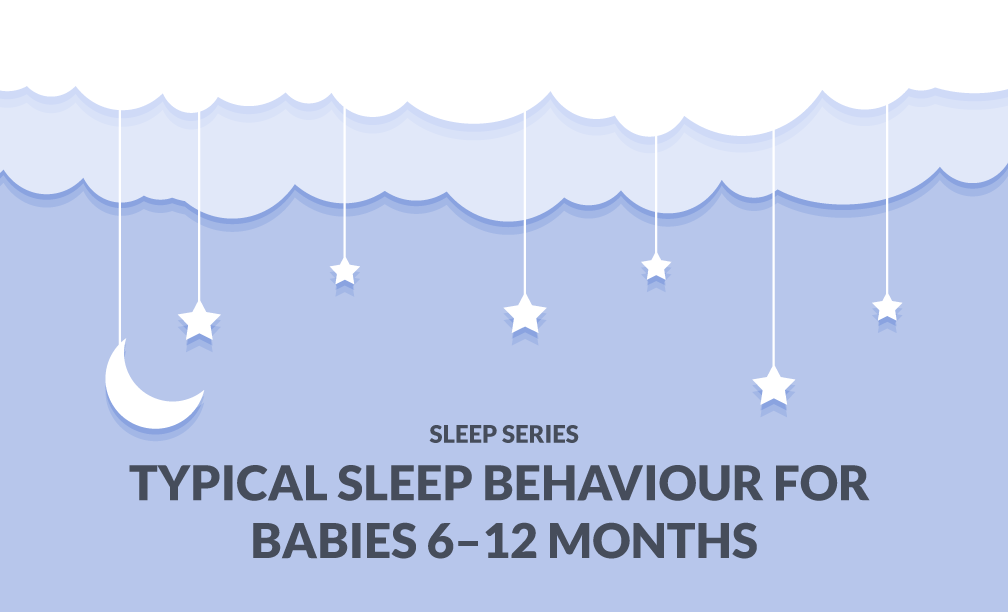Sleep and settling for early childhood - Typical sleep behaviour for babies 6–12 months
Babies at 6 – 12 months are beginning to know the difference between night and day. They may not need to wake up as much at night because night feeds will have reduced. At this age, most babies sleep 10 – 14 hours in a 24-hour period. Their longest sleep period tends to be at night.

Sleep patterns and behaviours From about the age of six months, your baby’s sleep patterns gradually become more developed.
They begin to recognise the difference between day and night.
As they are learning to self-settle and go back to sleep on their own, they may not wake up as much.
Most babies sleep 10–14 hours in a 24-hour period.
Every child is different, so don’t worry too much if your child has different sleep patterns to those described here. If you are concerned about your child, contact your Local Maternal and Child health nurse, doctor or the Maternal and Child Health Line on 13 22 29.
Sleep rhythms From six to 12 months of age babies tend to sleep for the longest period at night.
They may start to nap only about twice a day for one to two hours. Daytime napping is still important for the healthy development of your baby.
All babies are different, and your baby may sleep more or less.
Separation and your baby From six to 12 months, babies can become upset if you leave the room. During this stage, they may become distressed when you leave, even if it is for a short period of time. This is because they associate you as the person that cares for them and keeps them safe. This is known as person permanence. This is normal and does not mean that you can’t leave the room.
Your baby mostly wants to stay close to you at all times and may cry when they are separated from you. We sometimes call this separation anxiety. More information about anxiety in children, can be found on the Better Health Channel.
This means it might take longer for babies to fall asleep.
Settling The number of times your six to 12-month-old baby wakes up during the night may temporarily increase.
You can help your baby settle by:
- Placing your baby in their cot when they are tired, but still awake
- Recognising and responding to tired signs
- Using positive and consistent bedtime routines
- Using your presence as a safety signal to reduce your baby’s anxiety by sleeping in their room - parental presence
- Staying in their room until they fall asleep and then leaving - camping out
- Letting them cry for a short period of time before responding, this needs to be done correctly to be effective - controlled comforting.
There are a few different strategies you can use to help your baby to help your baby sleep and settle. By six months your will begin to recognise their signs and cues.
Every baby and family is different and it is up to you to decide which strategy you are comfortable with and works for you and your baby.
To learn more about each of the things in this list, download ‘Factsheet 8: Preventing sleep concerns: babies 6–12 months’ and Factsheet 11: Solutions to sleep concerns: babies 6–12 months from the Better Health Channel.
If you are worried about your baby’s sleep and settling, track how long and when your baby is sleeping, every day for a week or so. This can give you a clear idea of what might be going on.
If you are still concerned after you have tried different approaches for one to two weeks, talk to your Maternal and Child Health nurse, doctor or call the Maternal and Child Health Line on 13 22 29.
Credit to https://www.betterhealth.vic.gov.au/
Services
Audiologists
Children’s centres
Chiropractors
Counsellers
Dentists
Dieticians and nutritionists
Disability services
Doctors
Hospitals
Kindergartens
Kinesiologist
Maternal child health nurses
Medical clinics
Midwives and nurses
Nurses on call
Occupational therapists
Optometrists
Paediatricians
Physiotherapists
Playgroups
Podiatrists
Psychologists
Speech pathologists
FamilyAssist is a Latrobe Health Innovation Zone initiative funded by the State Government.
The Latrobe Health Assembly respectfully acknowledges Aboriginal people as the Original Custodians of the land we walk on today – the land of the Braiakaulung people of the Gunaikurnai nation and passes on respect to their elders past and present, future and emerging.